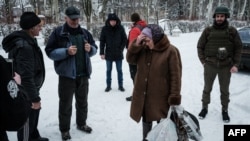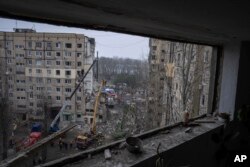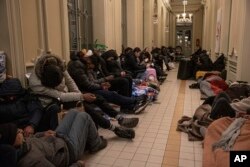The United Nations is appealing for $5.6 billion to provide humanitarian assistance to millions of Ukrainian civilians affected by Russia’s invasion of their country nearly one year ago.
The bulk of the joint Humanitarian Response and Refugee Response Plans launched Wednesday — $3.9 billion — will help ease the plight of 11.1 million people displaced or living precariously inside Ukraine, while $1.7 billion will assist 4.2 million Ukrainian refugees and communities hosting them in 10 European countries.
Martin Griffiths, undersecretary-general for humanitarian affairs and emergency relief coordinator, said U.N. teams in Ukraine are prioritizing the needs of people living on the Ukrainian side of the front lines in areas of great danger and difficulty.
“Yesterday, U.N. staff in Dnipro travelled in six pre-loaded trucks and headed to the Donetsk region, some 200 kilometers away, to two villages in the worst of those war zones,” he said. “It is a very hot area of the war at the moment. People are under daily shelling, daily attacks, homes bombed, freezing cold, electricity problems.”
His colleagues, Griffiths said, delivered medicine, heaters, food, blankets, and other essential relief for 1,200 people.
He added, “That goes on day in, day out in Ukraine as a result of this terrible war.”
Since Russian forces attacked Ukraine on February 24, 2022, the Office of the U.N. High Commissioner for Human Rights has recorded 18,955 civilian casualties, including 7,199 killed and 11,756 injured — among them many women and children.
However, when it released the latest estimates Monday, the agency noted that “OHCHR believes that the actual figures are considerably higher.”
The U.N. refugee agency reports Russia’s invasion of Ukraine has triggered the fastest growing refugee crisis in Europe since World War II, displacing about one third of Ukraine’s population of 40 million.
Filippo Grandi, the U.N. high commissioner for refugees, says Russia’s war of aggression against Ukraine also has created the largest displacement crisis in the world.
“Almost six million estimated internally displaced people, plus the refugees in Europe who have registered for temporary protection, are close to five million, 4.8 million. “But we know that there are many more that have not. So, the scale of displacement continues to be quite massive,” he said.
The Refugee Response Plan includes 10 refugee host countries: Bulgaria, Czech Republic, Estonia, Hungary, Latvia, Lithuania, Moldova, Poland, Romania, and Slovakia.
Grandi says the temporary protection arrangements offered by those countries have provided refugees with the right to work, access services and to be included in national systems.
“We must not, however, take this response, or the hospitality of host communities, for granted,” he said. “Continued international support and solidarity is needed until refugees are able to return to their homes in safety and dignity, which must also remain a priority.”
Grandi recognized that the appeal for Ukraine is very large and is in stiff competition with other humanitarian crises at a time when funding is scarce.
“It is not our fault if there are many crises,” he said. “The appeal is large because the needs are enormous.”
He warned the needs might get even larger “if God forbid, the military evolution develops even worse than it already is.”
He said contingency plans of various kinds have been drawn up to take that likelihood into consideration.
“These appeals that we are launching takes into account the likelihood of protracted hostilities that do affect civilians and civilian infrastructure, of the pace and scale that we have seen in the last few months,” he said.







